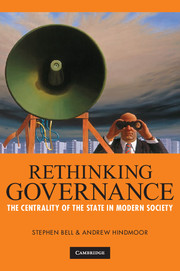Book contents
- Frontmatter
- Contents
- Figures and tables
- Preface
- 1 A state-centric relational approach
- 2 The resilient state
- 3 Metagovernance and state capacity
- 4 Hierarchy and top-down governance
- 5 Governance through persuasion
- 6 Governance through markets and contracts
- 7 Governance through community engagement
- 8 Governance through associations
- 9 Conclusion
- Notes
- Bibliography
- Index
2 - The resilient state
Published online by Cambridge University Press: 05 June 2012
- Frontmatter
- Contents
- Figures and tables
- Preface
- 1 A state-centric relational approach
- 2 The resilient state
- 3 Metagovernance and state capacity
- 4 Hierarchy and top-down governance
- 5 Governance through persuasion
- 6 Governance through markets and contracts
- 7 Governance through community engagement
- 8 Governance through associations
- 9 Conclusion
- Notes
- Bibliography
- Index
Summary
Arguments about governance are closely connected to those about the fate of the nation-state. In many commentaries, the state is depicted as ineffective, fiscally constrained, weakened by globalisation and increasingly unable to respond to the demands placed upon it. In response, so the argument goes, states have off-loaded substantial responsibility onto alternative modes of governance. This chapter restores some balance to the governance debate by highlighting the ongoing importance of the state. Far from being hollowed out, governments and state agencies remain the central architects of governance strategies. Rather than receding, states are changing and adapting in the face of new challenges and experimenting with more elaborate forms of both hierarchical and relational governance.
It was during the 1970s that social scientists seriously began to question the existing capacity and future relevance of nation-states. At a time when the world economy was faltering and terrorist groups like the Baader–Meinhof Gang in Germany and the Red Brigades in Italy were threatening the stability of mature liberal democracies, it became common to talk of government ‘overload’ and an impending ‘legitimacy crisis’. In the 1980s and 1990s the economic and political environment changed and, in most countries, improved. Yet many academics, buoyed by concerns about globalisation and regulatory failure, proclaimed the retreat (Strange, 1996), decline (Mann, 1990) or even death (Hobsbawm, 1990) of the nation-state.
Arguments about the state underlie discussions of governance and, in particular, the society-centred account of governance reviewed in the previous chapter.
- Type
- Chapter
- Information
- Rethinking GovernanceThe Centrality of the State in Modern Society, pp. 20 - 45Publisher: Cambridge University PressPrint publication year: 2009

